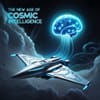The integration of artificial intelligence (AI) and space exploration is ushering in a new era of cosmic intelligence, transforming the way we venture into the universe. AI is playing a crucial role in space exploration, from analyzing vast amounts of data to enabling autonomous decision-making in spacecraft.
One of the significant challenges in space exploration is the vast distance between Earth and spacecraft, which can lead to delayed communication and decision-making. AI helps bridge this gap by enabling spacecraft to make decisions autonomously, without relying on human intervention.
AI is also being used to analyze data from space missions, helping scientists to identify patterns and make new discoveries. For instance, AI-powered algorithms can analyze images of celestial bodies, identifying features and anomalies that might be missed by human eyes.
The potential applications of AI in space exploration are vast, ranging from planetary exploration to asteroid mining and space tourism. As AI continues to evolve, it is likely to play an increasingly important role in humanity's quest to explore and understand the universe.
The integration of AI and space exploration is not only advancing our understanding of the cosmos but also paving the way for new frontiers in space travel and exploration. With AI on board, spacecraft can navigate through uncharted territories, make decisions in real-time, and uncover secrets of the universe that were previously unknown.
As we continue to push the boundaries of space exploration, the role of AI will become even more critical. By leveraging AI's capabilities, we can unlock new discoveries, drive innovation, and expand our understanding of the universe. The future of space exploration is undoubtedly intertwined with the future of AI, and the possibilities are endless.


